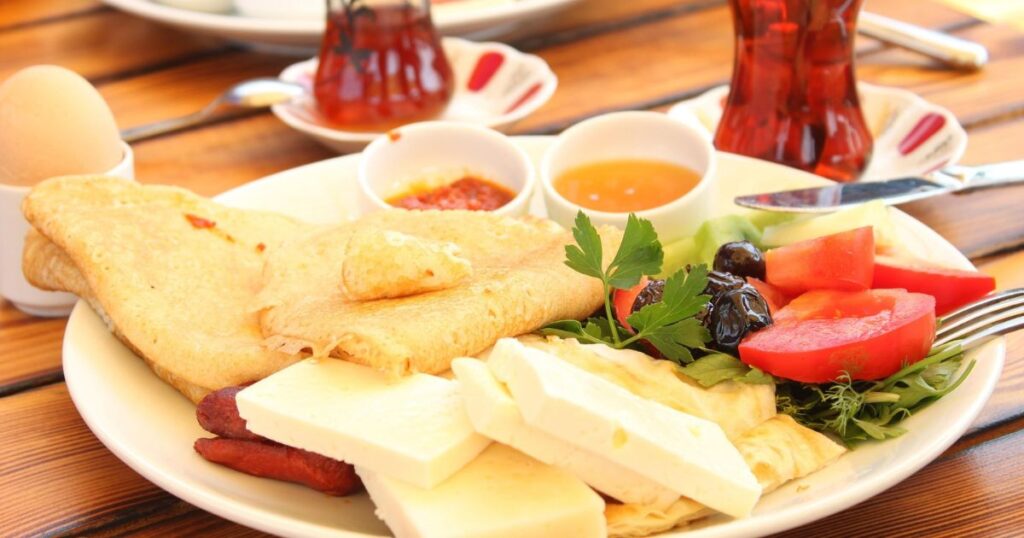Imagine waking up to a table full of colors, smells, and tastes. The traditional Turkish breakfast is more than a meal. It’s a journey for your senses that makes your morning special.
From the start, you’ll see why it’s not just eating. It’s a celebration of life, connection, and heritage.
Turkish breakfast is not just about food. It’s a cultural tradition that brings people together. It’s filled with stories of local ingredients, family recipes, and Turkish hospitality. The variety of Turkish breakfast will amaze you, changing how you see morning meals.
Exploring Turkish breakfast is more than tasting food. It’s diving into a rich cultural tradition. It turns the most important meal into an epic adventure.
Key Takeaways
- Turkish breakfast is a vibrant cultural experience beyond simple nutrition
- Traditional Turkish breakfast items offer incredible flavor diversity
- Breakfast is a social ritual that connects people and generations
- Each region in Turkey brings unique ingredients and preparation styles
- The meal represents hospitality, warmth, and community spirit
What Makes Turkish Breakfast a Cultural Phenomenon
Turkish breakfast is more than a meal; it’s a cultural experience that unites people. It combines social connections, traditions, and culinary artistry. This morning ritual strengthens community and family bonds.
The Social Significance of Morning Gatherings
In Turkey, breakfast is a time for connection. Families and friends come together, sharing food, stories, and laughter. These gatherings turn breakfast into a celebration of life and relationships.
- Extended family connections strengthened
- Conversation and storytelling encouraged
- Informal social networking happens naturally
Historical Evolution of Turkish Morning Meals
The history of Turkish breakfast goes back centuries. It reflects the diverse culinary influences of the Ottoman Empire. Breakfast has evolved, yet its social importance remains strong.
Regional Variations Across Turkey
Every region in Turkey adds its own twist to breakfast. The Black Sea offers cornbread, while the Mediterranean brings herb-infused spreads. This diversity makes Turkish breakfast dishes truly unique.
- Black Sea region: Hearty, corn-based specialties
- Aegean coast: Fresh herbs and olive oil
- Eastern Anatolia: Meat-focused preparations
Exploring these traditions shows how Turkish breakfast goes beyond just eating. It’s a cultural expression that bridges generations and communities.
Essential Components of a Traditional Turkish Breakfast
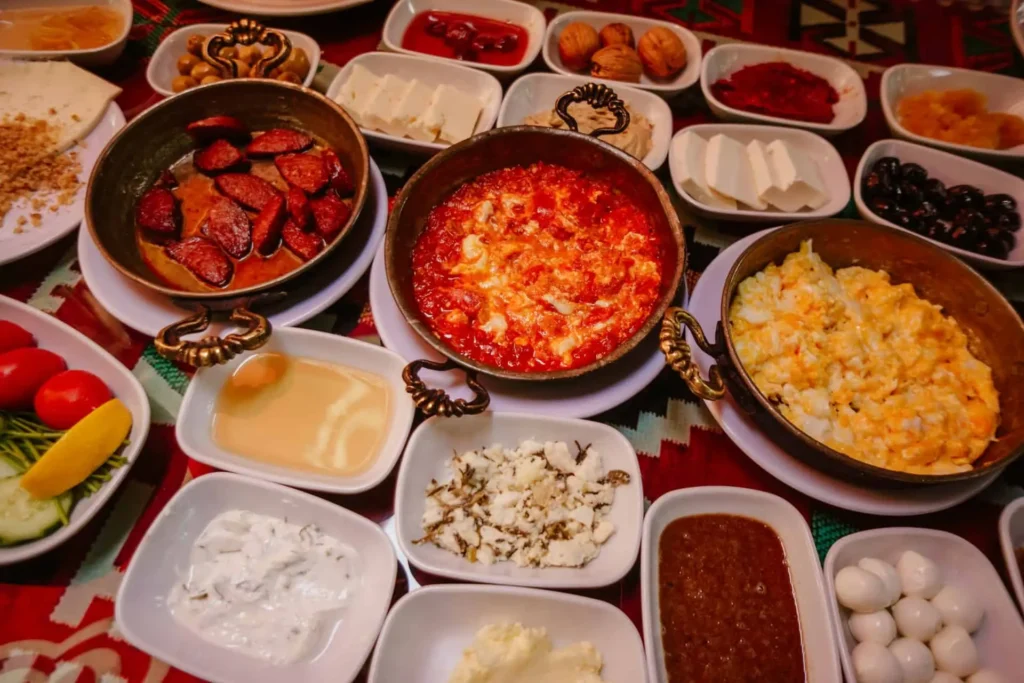
Exploring Turkish breakfast cuisine opens up a world of flavors and traditions. It turns breakfast into a cultural experience. You’ll find a mix of tastes, textures, and customs that make it special.
A typical Turkish breakfast table has many delicious items:
- Cheese Varieties: Multiple types of fresh and aged cheeses
- Fresh vegetables and herbs
- Olives and olive-based spreads
- Eggs prepared in different regional styles
- Various breads and pastries
This breakfast tradition is all about sharing. You’ll see many small plates with colorful foods. They encourage you to share and talk with others. Cheeses like beyaz peynir, spicy sausage, and fresh eggs are key.
Every region in Turkey has its own twist on breakfast. Some places have more meat, while others have vegetable spreads. This makes every breakfast unique.
Trying a traditional Turkish breakfast is a journey of the senses. It connects you to Turkey’s rich food heritage.
Turkish Breakfast Spreads: A Symphony of Flavors and Textures
A true Turkish breakfast is more than just morning food. It’s a colorful mix of flavors and textures that changes how you see breakfast.
The beauty of Turkish breakfast is its variety. Each part works together to create a feast for your senses. It’s a journey that pleases your taste and soul.
Cheese Varieties: A Delectable Journey
Turkish breakfast offers a wide range of cheeses. These cheeses show off the country’s skill in dairy. You’ll find amazing cheeses like:
- Beyaz Peynir: A crumbly white cheese similar to feta
- Kaşar: A semi-hard yellow cheese with mild flavor
- Tulum: An aged cheese with robust, tangy characteristics
Olive and Oil-Based Delicacies
Olives are a big part of Turkish breakfast. They come in green and black, adding different tastes. Olive oil-based dishes add smooth, rich flavors to the meal.
Fresh and Preserved Vegetables
Vegetables are key in balancing the breakfast. You’ll find fresh cucumber and tomato slices, and pickled veggies. They add crunch, nutrition, and color, making the meal beautiful.
Your Turkish breakfast becomes a colorful feast. It invites you to enjoy and discover each part with excitement.
The Art of Turkish Tea Service at Breakfast

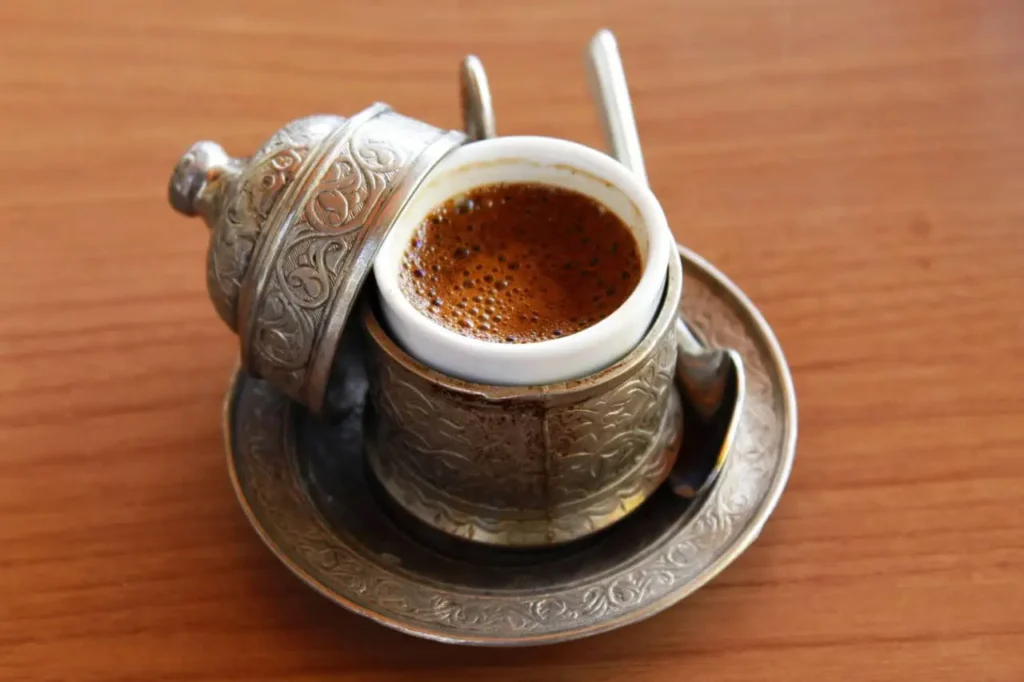
In Turkish breakfast culture, tea is a true cultural icon. Your morning meal isn’t complete without a tulip-shaped glass of steaming, deep-red tea. Turkish breakfast is more than food—it’s a ritual where tea is the star.
Brewing Turkish tea is an art that needs precision and passion. The traditional double-tiered tea kettle, called a çaydanlık, makes a brew that’s strong yet nuanced. Tea preparation involves:
- Selecting high-quality black tea leaves
- Using precisely heated water
- Steeping at the perfect temperature
- Serving at an ideal strength
Social interactions during Turkish breakfast center around tea. Friends and family gather, refilling glasses and talking. Tea is more than a drink—it’s a bridge connecting people, creating moments of joy and connection.
Each glass of tea tells a story of hospitality and tradition. From small villages to busy city cafes, the ritual stays the same: hot tea, warm talk, and a sense of community that lasts through generations.
Bread and Pastry Varieties in Turkish Breakfast
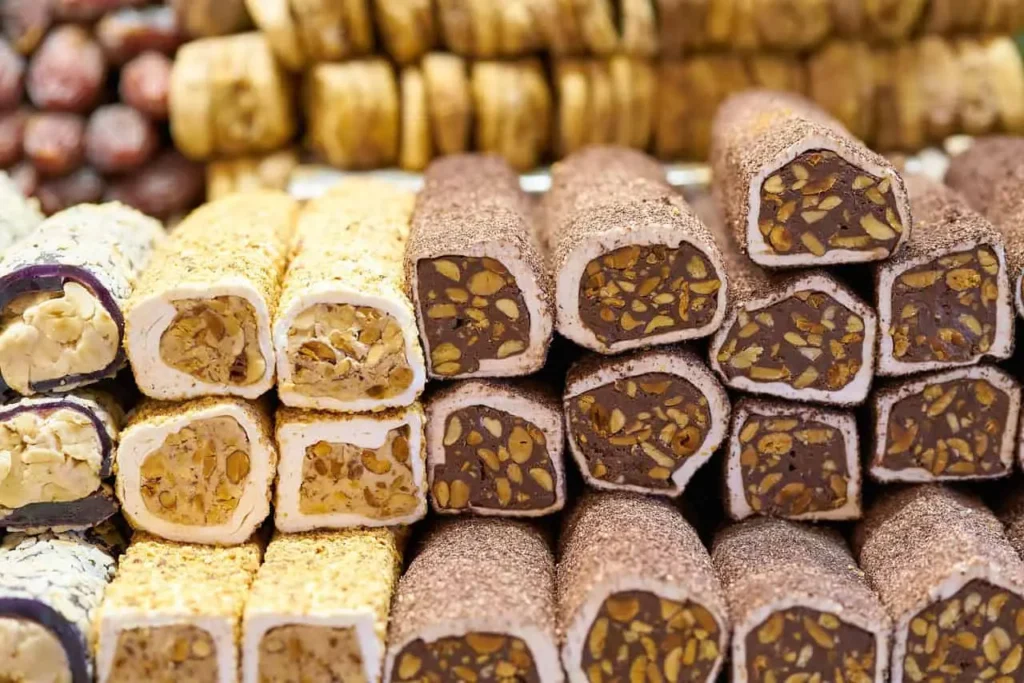
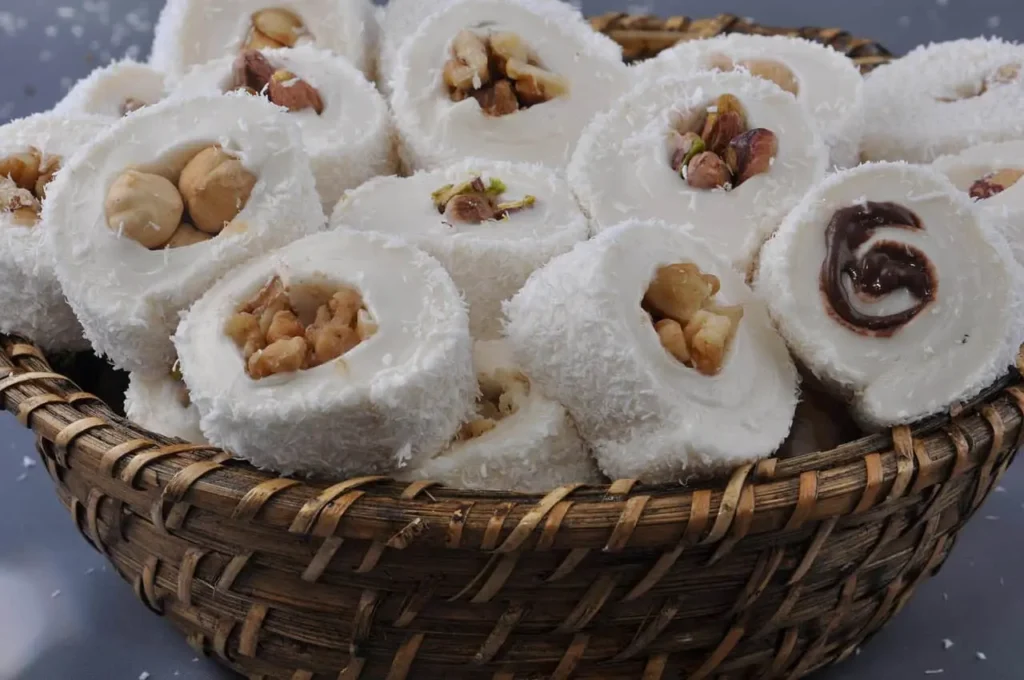
Bread and pastries are key in Turkish breakfast. They make the meal special with their flavors and textures. Turkish breakfast is all about these delicious breads.
The Iconic Simit: A Cultural Bread Treasure
Simit is a must-try in Turkish breakfast. It’s a circular bread with sesame seeds. It’s not just food; it’s a cultural symbol.
Street vendors sell it everywhere in Turkey. It’s a big part of the morning.
Regional Bread Specialties Across Turkey
Turkey has many breads, each with its own story. These breads show the country’s rich food culture:
- Pide: A soft, boat-shaped bread from central Anatolia
- Bazlama: A thick, round flatbread popular in rural areas
- Lavash: Thin, soft bread often used for wrapping
Sweet Pastry Delights
Sweet pastries are a big part of Turkish breakfast. Pastries like poğaça and açma add sweetness to the meal.
These breads and pastries make Turkish breakfast special. They bring you closer to Turkish food traditions.
Where to Find the Best Turkish Breakfast in Istanbul
Istanbul is a treasure trove of Turkish breakfast experiences. It will excite your taste buds and introduce you to local food traditions. The city’s food scene is alive with many Turkish breakfast cafes that bring authentic morning vibes.
As you explore Istanbul’s breakfast scene, keep an eye out for these neighborhoods:
- Karaköy: A trendy district with modern Turkish breakfast spots
- Beyoğlu: Historic area featuring traditional breakfast restaurants
- Kadıköy: Local favorite with family-run breakfast establishments
Here are some top Turkish breakfast cafes to try:
- Van Kahvaltı Evi – Known for its extensive regional breakfast spread
- Café Privato – Offers contemporary takes on classic breakfast dishes
- Çiya Sofrası – Celebrated for authentic regional specialties
Each cafe offers a unique dining experience. You’ll find everything from lavish spread platters to cozy cafe settings. Local restaurants focus on fresh ingredients, handmade breads, and traditional cooking methods. These efforts turn a simple meal into a cultural celebration.
Pro tip: Get to popular Turkish breakfast cafes early to get the best seat. Weekend mornings are the best time to see locals enjoying long breakfasts together.
How to Create Your Authentic Turkish Breakfast at Home
Making a traditional Turkish breakfast at home is simple. Just get the right ingredients and follow a few steps. You’ll turn your morning meal into a fun and tasty experience that shows off Turkish breakfast culture.
Essential Ingredients Shopping Guide
To make a real Turkish breakfast, you need some key items. Start by getting these basic ingredients:
- Beyaz peynir (white cheese)
- Kalamata olives
- Fresh tomatoes and cucumbers
- Honey and kaymak (clotted cream)
- Sucuk (spicy Turkish sausage)
- Simit (circular sesame bread)
Table Setting and Presentation Tips
How you present your breakfast matters a lot. Arrange your ingredients on small plates to make a colorful display. Use Turkish tea glasses and a çay pot to add to the feel. Make your dining area welcoming for sharing and talking.
Menu Planning for Different Group Sizes
Planning your Turkish breakfast menu is easy, no matter the size of your group. For small groups, pick 4-5 main items. For bigger groups, add more cheeses, pastries, and cold cuts.
- Small group (2-4 people): 3-4 cheese varieties, olives, tomatoes, bread
- Medium group (5-8 people): Add sucuk, menemen (Turkish scrambled eggs), additional pastries
- Large group (8+ people): Include more variety of meats, multiple egg dishes, diverse breads
A true Turkish breakfast is about warmth and sharing. It’s about enjoying fresh, delicious foods with others.
Conclusion
Turkish breakfast is more than just a meal. It’s a deep cultural experience that brings people together. It connects traditions and generations through food and dining.
Every bite of Turkish breakfast tells a story. It shows the diversity and history of Turkey. From Istanbul’s simit to Anatolia’s village breads, it celebrates local ingredients and old ways of cooking.
Visiting Turkey or making these breakfasts at home, remember the importance of sharing. Turkish breakfast is about more than food. It’s about the warmth, conversations, and connections that come with it.
Appreciating Turkish breakfast helps us understand a culture that values food as art and a social ritual. Start your own tradition. Invite friends and family. Enjoy the unique flavors that make Turkish mornings special.
FAQ
What makes Turkish breakfast so special compared to other breakfast traditions?
Turkish breakfast is special because it’s more than just a meal. It’s a time to connect with others. Unlike fast breakfasts, Turkish breakfast is a slow, joyful spread with many dishes.
It includes cheeses, olives, veggies, eggs, and pastries. This meal is a celebration that lasts 1-2 hours. It’s all about sharing, talking, and enjoying food with loved ones.
What are the must-have items in a traditional Turkish breakfast?
Essential items for Turkish breakfast are çay (Turkish tea) and simit (sesame-covered bread). You’ll also find cheeses, olives, tomatoes, cucumbers, honey, and kaymak (clotted cream).
Menemen (scrambled eggs with tomatoes and peppers) and jams are also key. Don’t miss out on sucuk (spicy sausage) and börek (savory pastries)!
How long does a typical Turkish breakfast usually last?
Turkish breakfast is a long, relaxed affair. It can last from 1 to 2 hours. It’s not about rushing but enjoying time with family and friends.
It’s about sipping tea, trying different dishes, and enjoying the moment at a calm pace.
Is Turkish breakfast healthy?
Yes, Turkish breakfast is very healthy! It has proteins, veggies, healthy fats, and whole grains. The variety of foods offers many nutrients.
It focuses on fresh, local ingredients, making it a nutritious meal choice.
Can vegetarians enjoy a traditional Turkish breakfast?
Absolutely! Turkish breakfast is great for vegetarians. Many items are naturally vegetarian, like cheeses, olives, and vegetable spreads.
There are also tomatoes, cucumbers, jams, honey, and egg dishes like menemen. Vegetarians can have a full and satisfying breakfast.
What type of tea is typically served during Turkish breakfast?
Turkish breakfast tea is Turkish black tea (çay). It’s served hot in tulip-shaped glasses. The tea is strong and robust.
It’s brewed in a special teapot called a çaydanlık. The tea is served all morning, showing hospitality and connection.
How can I recreate an authentic Turkish breakfast at home?
To make a real Turkish breakfast, focus on variety and freshness. Get different cheeses, olives, veggies, and quality bread.
Make menemen and buy or make simit. Use good honey and jams. Serve everything on a big tray and enjoy the meal slowly.
Remember, it’s about the experience and the food, not just the food itself!
